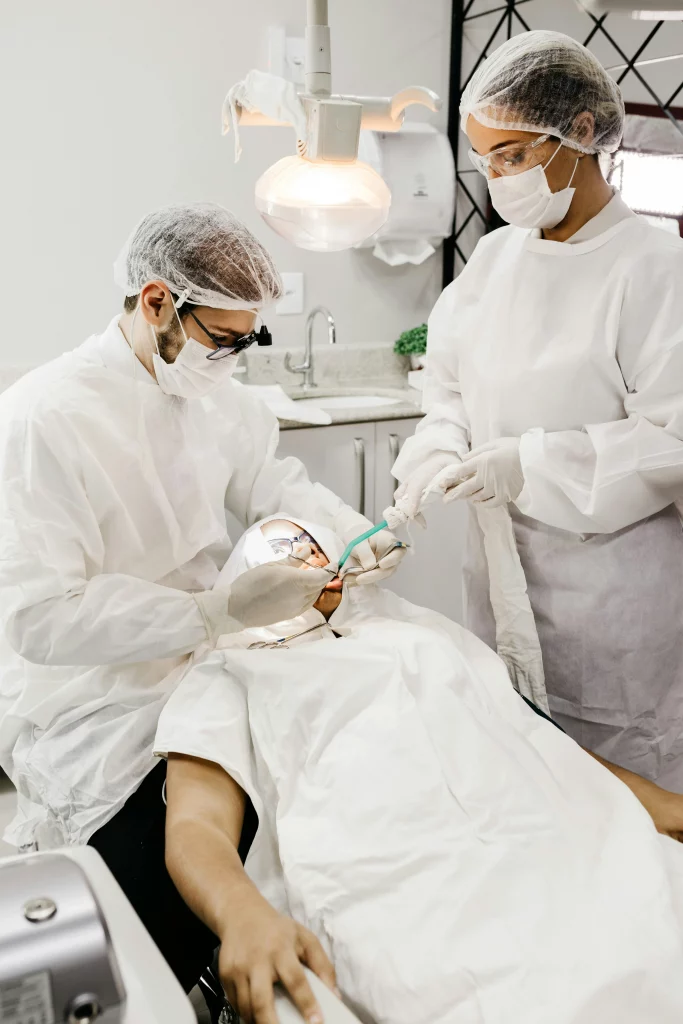Dental implants can be a life-changing solution for cancer survivors who have experienced tooth loss due to chemotherapy, radiation, or other treatment-related factors. Beyond restoring a smile, implants provide stability that dentures and bridges often cannot match. Tooth loss after cancer treatment can impact far more than appearance, it can make eating certain foods difficult, affect speech clarity, and even lower self-esteem. These challenges may also influence overall nutrition and long-term health if left unaddressed. Fortunately, with proper planning, thorough evaluation, and collaboration between dental professionals and oncologists, many survivors can safely receive dental implants. The result is not only improved function and comfort but also renewed confidence and a better quality of life after recovery.
Can Cancer Survivors Safely Get Dental Implants?

Many cancer survivors wonder if dental implants are a safe option after undergoing treatments like chemotherapy or radiation. Because these treatments can affect bone density, healing ability, and overall oral health, careful evaluation is essential before moving forward. The good news is that with medical clearance and the right treatment plan, many survivors are excellent candidates for implants. Working closely with both oncologists and dental professionals ensures that the procedure is safe, effective, and tailored to each patient’s unique needs.
How Chemotherapy and Radiation Affect Bone Health
Cancer treatments, particularly radiation and chemotherapy, can have significant effects on oral and bone health, sometimes temporarily and other times permanently. Radiation therapy targeting the jaw can reduce blood flow, lower bone density, and compromise the bone’s ability to heal properly, all of which can affect the successful integration of dental implants. Chemotherapy, on the other hand, may weaken the immune system and slow the body’s natural healing processes, increasing the risk of infection or complications after surgery. Additionally, certain medications or supportive therapies used during cancer treatment can further impact oral tissues and recovery.
By understanding these effects, dental professionals can develop a carefully tailored treatment plan that considers the patient’s medical history, timing of procedures, and overall health. This collaborative approach maximizes the chances of a safe and successful dental implant outcome.
The Role of Healing Time After Cancer Treatment
Timing plays a crucial role when considering dental implants after cancer therapy. Patients typically need to wait several months following treatment to ensure that their body has recovered enough to safely undergo implant surgery. This healing period allows the immune system to regain strength and the jawbone to stabilize, both of which are essential for successful implant integration. During this time, dentists and oral surgeons carefully assess overall health, bone density, and any lingering effects from cancer treatment that could affect healing.
In some cases, additional imaging or tests may be required to confirm that the bone is strong enough to support an implant. By carefully planning the timing, dental professionals can minimize risks and maximize the likelihood of a successful, long-lasting restoration.
When Implants Are Not Recommended Post-Treatment
Not all cancer survivors are immediate candidates for dental implants. Extensive radiation therapy can compromise jawbone quality, while ongoing chemotherapy may make surgery risky due to reduced healing capacity. Additionally, systemic conditions such as osteoporosis, diabetes, or immune system deficiencies can further limit eligibility for implantation. In these situations, dental professionals may recommend alternative solutions, such as removable prosthetics or temporary restorations, to restore function and aesthetics. These options provide a practical interim solution until the patient’s health and bone condition allow for safe implant placement. Careful evaluation and monitoring ensure that when the time comes, implants can be placed successfully and with minimal risk.
Preparing for Dental Implants After Cancer

Preparing for dental implants after cancer requires careful planning and coordination between your dental team and oncologist. Every patient’s medical history, treatment type, and healing progress must be considered to ensure safe and successful implantation. Proper preparation helps minimize complications, supports optimal bone integration, and sets the stage for long-term oral health and function.
Medical Clearances You Need Before Surgery
Before dental implant placement, cancer survivors typically undergo a comprehensive medical evaluation to ensure they are ready for surgery. Clearance from your oncologist is essential, as it confirms that the body has recovered sufficiently from treatments like chemotherapy or radiation and that the risk of infection, delayed healing, or complications is minimized. In addition to reviewing your medical history, blood tests and other diagnostic assessments may be performed to evaluate overall health and suitability for anesthesia if needed. This careful pre-surgical assessment allows the dental team to tailor the implant procedure to your specific needs, increasing the likelihood of a successful outcome and smooth recovery.
Collaboration Between Oncologists and Dentists
Successful dental implant placement after cancer relies on a collaborative, team-based approach. Dentists, oral surgeons, and oncologists work closely to evaluate timing, bone quality, and the patient’s overall health, ensuring that every aspect of care prioritizes safety and effectiveness. This coordinated strategy minimizes the risk of complications, promotes proper healing, and ensures that implants are positioned to support long-term oral function, comfort, and aesthetics. By combining expertise from multiple specialties, patients can achieve optimal outcomes and regain confidence in their smile.
Importance of Bone Density Scans and Blood Tests
Bone density scans play a crucial role in evaluating the jaw’s capacity to support dental implants safely. Cancer treatments like radiation or chemotherapy can compromise bone quality, making it essential to assess whether the existing bone can hold an implant securely. Advanced imaging allows dentists to identify areas that may require additional procedures, such as bone grafting or sinus lifts, to strengthen the jaw. Blood tests further help detect nutritional or systemic deficiencies that could impair healing, enabling the healthcare team to address these issues proactively before implant placement. This thorough preparation maximizes the chances of successful integration and long-term implant stability.
Implant Success Rates in Cancer Survivors
Dental implants can be highly successful for cancer survivors when proper precautions are taken. Success rates depend on factors such as the type and timing of cancer treatment, bone quality, and overall health. Studies show that with careful planning, including bone assessment and collaboration with oncologists, many survivors achieve long-term implant stability. Ongoing follow-up care, good oral hygiene, and regular dental visits further enhance outcomes, allowing survivors to regain both function and confidence in their smiles.
How Radiation to the Jaw Impacts Implant Stability
Chemotherapy and certain medications can also influence healing and implant integration. While these treatments may temporarily suppress the immune system or affect bone regeneration, careful timing and coordination with your healthcare team can help optimize outcomes. By tailoring the procedure to each survivor’s unique health status, dentists can improve the likelihood of successful, long-lasting implants.
Studies on Implant Longevity in Post-Cancer Patients
Research indicates that dental implants in cancer survivors, when carefully selected and strategically placed, can achieve success rates similar to those in the general population. Key factors contributing to long-term stability include maintaining excellent oral hygiene, having sufficient and healthy bone structure, and ensuring that the patient is free from active cancer or ongoing treatments that may compromise healing. Regular monitoring and follow-up visits allow the dental team to assess bone integration, detect any early signs of complications, and provide timely interventions if needed. With proper planning, coordination with oncologists, and patient commitment to oral care, implants can restore both function and confidence for cancer survivors, significantly improving quality of life.
Techniques That Improve Implant Success in Survivors
Specialized surgical techniques play a crucial role in improving dental implant outcomes for post-cancer patients. Bone grafting may be used to rebuild or strengthen areas of the jaw that have been weakened by radiation or surgery, providing a solid foundation for implants. Advanced implant designs with surface treatments encourage faster and more reliable bone integration, even in compromised bone. Customized prosthetics are crafted to distribute chewing forces evenly, reducing stress on the jaw and ensuring long-term functionality. Every treatment plan is carefully tailored to the individual’s medical history, current health status, and oral anatomy, maximizing both safety and success. This personalized approach allows cancer survivors to regain confidence in their smile while restoring essential oral function.
Restoring Quality of Life with Implants
Dental implants can have a profound impact on a cancer survivor’s quality of life. Beyond improving appearance, they restore essential functions such as chewing, speaking, and maintaining proper nutrition. Many patients report increased confidence and a greater willingness to engage in social, professional, and personal activities. With implants, survivors can enjoy meals without discomfort, speak clearly without worry, and smile freely, regaining a sense of normalcy. The combination of careful planning, expert care, and modern implant technology allows survivors to rebuild both function and confidence, making everyday life more comfortable and fulfilling.
Regaining Confidence After Tooth Loss from Treatment
Tooth loss can significantly impact self-esteem and social confidence, especially for cancer survivors who have already faced major medical challenges. Missing teeth can make speaking, eating, or smiling feel uncomfortable, which may lead to social withdrawal or lowered confidence. Dental implants provide natural-looking, stable replacements that allow patients to speak clearly, chew effectively, and smile without hesitation. Beyond restoring appearance and function, having a complete set of teeth can support psychological recovery, boost emotional well-being, and help survivors feel more like themselves again. Many patients also report renewed motivation to engage socially and maintain overall oral health, reinforcing both physical and emotional resilience.
Eating Comfortably Again with Stable Implants
Dental implants offer chewing stability that traditional dentures often cannot provide. With secure implants, cancer survivors can comfortably eat a wider variety of foods, which supports proper nutrition and digestion. This advantage is particularly important after cancer treatment, when maintaining a balanced diet is essential for overall health, energy levels, and continued recovery. Implants also reduce the risk of discomfort or slippage during meals, allowing patients to enjoy eating without anxiety. Over time, this improved functionality contributes to better physical well-being and reinforces confidence in daily life.
How Implants Improve Speech and Overall Health
Missing teeth can significantly impact speech, often causing slurred or mumbled words that affect communication. Dental implants restore the natural structure of the mouth, allowing for clearer articulation and more confident speaking. Beyond improving speech, implants stimulate and preserve jawbone density, preventing bone loss that can lead to additional oral health problems. Maintaining this bone structure also supports facial contours, helping survivors retain a natural appearance. Over time, implants contribute to both functional and aesthetic benefits, enhancing overall quality of life.
Frequently Asked Questions (FAQs)
1. Can I get implants after chemotherapy or radiation?
Yes, many cancer survivors can safely receive dental implants after completing treatment, but timing plays a critical role. Oncologists and dentists carefully evaluate factors such as bone health, immune function, and overall healing capacity before moving forward. In some cases, supportive procedures like bone grafting may be needed to strengthen the jaw and improve success rates. Radiation or chemotherapy can impact healing, so recovery time is often necessary before surgery. With proper planning and collaboration between medical and dental teams, dental implants can be placed safely. This thoughtful approach ensures both long-term function and patient well-being.
2. Do cancer survivors face higher risks of implant failure?
While cancer treatments can affect bone strength and healing ability, thorough evaluation and modern surgical techniques greatly lower these risks. Research shows that with careful planning, dental implants can achieve successful integration even in patients who have received chemotherapy or radiation. In some cases, additional procedures like bone grafting or hyperbaric oxygen therapy may be recommended to enhance outcomes. Consistent follow-up appointments and maintaining excellent oral hygiene are also critical in protecting both the implants and overall oral health. With this comprehensive approach, many cancer survivors enjoy long-lasting, stable results from dental implants.
3. How long should I wait after cancer treatment before implant surgery?
The ideal waiting period for dental implants after cancer treatment depends on the type of therapy received, its intensity, and how well the body has recovered. In many cases, dentists recommend waiting six months to a year to allow bone tissues to stabilize and the immune system to regain strength. This healing time helps reduce complications and improves implant success rates. Ultimately, your oncologist and dental team will work together to provide personalized recommendations based on your medical history, current health, and readiness for surgery.
4. Will my insurance cover implants after cancer-related tooth loss?
Insurance coverage for dental implants after cancer treatment often varies widely. Some policies classify implants as a cosmetic procedure and may not cover them, while others recognize them as a reconstructive necessity, especially when tooth loss is directly related to cancer therapy. In certain cases, partial coverage may be available for the surgical component but not the prosthetic crown. Because every plan is different, the best approach is to speak with both your insurance provider and your dental office. They can help clarify your benefits, provide pre-authorization if needed, and outline expected out-of-pocket costs so you can plan confidently.
5. Are there alternatives if implants aren’t safe for me?
Yes, alternatives to dental implants are available for cancer survivors who may not be immediate candidates for surgery. Removable dentures and dental bridges can restore both function and appearance, helping patients eat and speak more comfortably. In some situations, partial dentures or customized prosthetics offer a practical solution until implant placement becomes possible. These options provide flexibility and allow patients to maintain oral health while their body continues to recover. Your dentist will recommend the most suitable choice based on your current health, bone condition, and long-term treatment goals.
Regaining your smile after cancer treatment is possible, and dental implants can provide the stability, comfort, and confidence you deserve. With careful planning, medical collaboration, and expert dental care, implants can restore your oral function and improve quality of life. Don’t let tooth loss hold you back from enjoying meals, conversations, and everyday moments with confidence. Schedule a consultation today to discuss your options and take the first step toward a healthier, complete smile.


